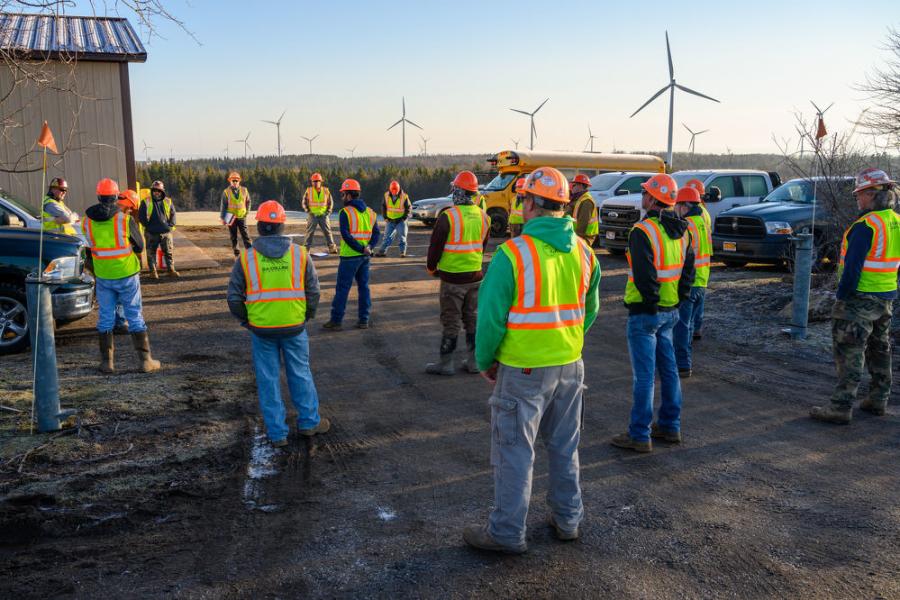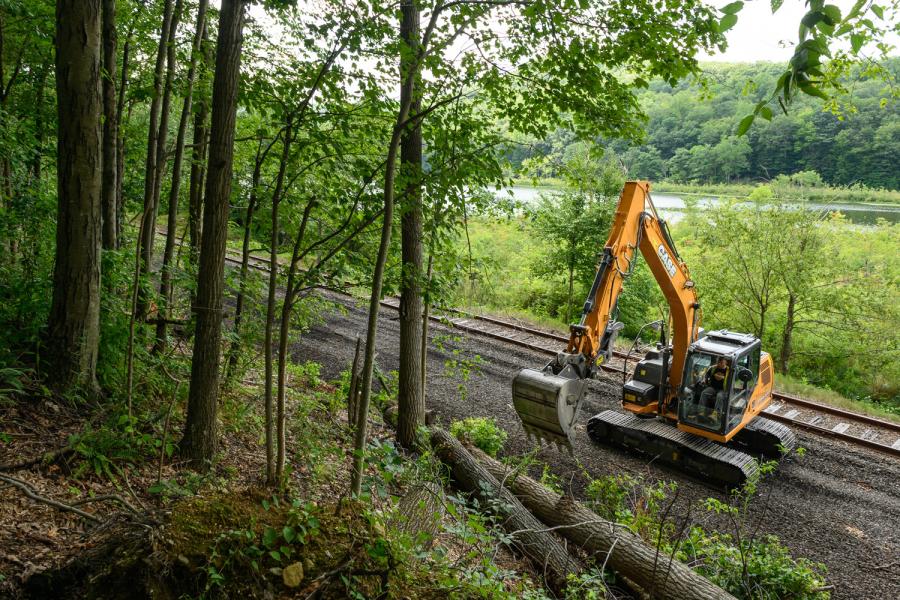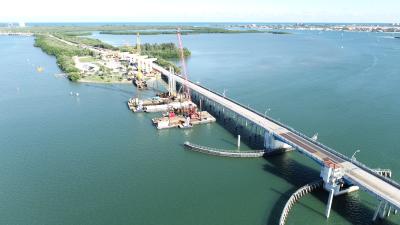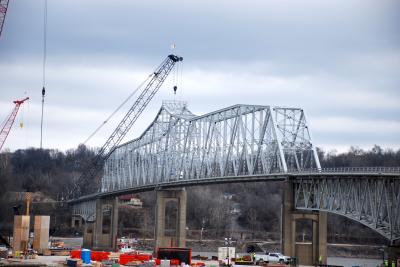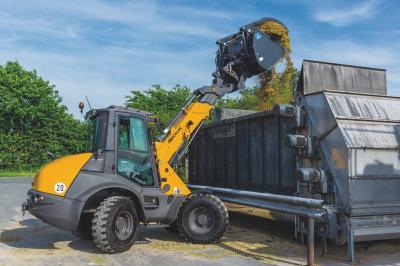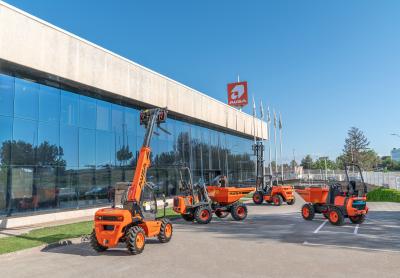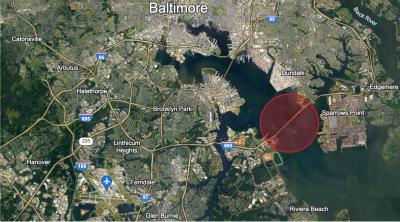“On all our projects we have a morning team meeting and the first thing we do is stretch and flex, while maintaining six feet of social distancing, for about eight minutes or so, working from our fingers to our feet,” said Tim Delaney, TWG’s founder and president.
In late March, New York Gov. Andrew Cuomo announced that many construction projects in his state would be frozen due to the rapid and disastrous spread of COVID-19. The type of work contractors perform in the Empire State were placed on two lists: "essential" and "non-essential." with those in the latter category ordered to close until further notice.
The governor's directive meant that many commercial building projects in the state had to be shuttered. The list of "essential" building jobs, though, included infrastructure construction projects. Thus, a reprieve was given to contractors that build roads, bridges, transit facilities, utilities, healthcare facilities, shelters and schools, though many have had to work with reduced staffing.
The caveat, of course, is that those contractors stay vigilant to make sure staff and crew on each project practice social distancing measures. For office staff, that means working at home as much as possible. On a company project, crew members must wear face coverings and maintain no less than six feet of space between themselves and their co-workers. Job sites that fail to follow these best practices can be closed and receive heavy fines, per the state's coronavirus guidelines.
Although many construction workers primarily work outdoors and in open space away from their co-workers, the requirements of each job sometimes dictate that they must work close together — a probable bad scenario in a pandemic.
New York's building requirements have meant that many contractors must find creative ways to keep their projects moving ahead. Most have had to work with reduced crew sizes and have assigned their executives and staff members to work from home to work.
TWG Has Reputation for ‘Safety First'
One of New York State's best infrastructure builders, The Wesson Group LLC, also has had to adapt to the new realities of 2020 to conduct its business. TWG continues to work its important contracts across the state, including the construction of significant heavy civil and transportation projects, as well as marine and alternative energy initiatives, most notably industrial-scale wind farm developments.
And it may be that TWG is among the better-prepared building companies to work through the threat of coronavirus. No company could possibly foresee and adequately prepare for the danger of coronavirus, as few people had even heard of such a threat even a year ago. But, TWG has long been known as a company with an ingrained sense of "safety first" in the performance of its work.
That comes from Tim Delaney, TWG's founder and president, a man with a well-earned reputation in the business after almost 40 years of operating two different construction companies in the Empire State. TWG's base of operations is in town of Johnstown, near Albany/Saratoga Region.
The protocols Delaney and his staff put in place to ensure a safe work environment were implemented years ago, but with COVID-19 now on the rampage in his state, those plans have been adjusted.
"We follow all the guidelines from the Centers for Disease Control, the New York State Department of Health and Gov. Cuomo's office," Delaney said. "Each time there is a regulation change, it does force us to re-evaluate the way we are doing business, but we have a great staff that is constantly working to ensure we are implementing all the new standards and regulations in our main office and on our project sites."
In addition, he said TWG has been consulting with the Associated General Contractors of New York State the best ways to conduct its business amid the crisis. The AGC NYS has been providing valuable resources to its membership, including the expertise of both insurance carriers and lawyer members within the group.
"Throughout the COVID-19 crisis, we keep several staff rotating in the main office to make sure we are continuing to offer best-in class service for our clients," Delaney said. "Our project managers, quality control staff and safety staff are continuing to work from our project sites, while observing the required physical distancing."
Crews Given Tools to Fight Virus Spread
Delaney and his management staff have adopted new daily procedures to restrict the threat of COVID-19 — measures folded into TWG's older safety practices designed to reduce the number of injuries on the job.
"On all our projects we have a morning team meeting and the first thing we do is stretch and flex, while maintaining six feet of social distancing, for about eight minutes or so, working from our fingers to our feet," he said. "We have been doing that because many of the worker compensation claims on site are due to muscle tears.
"We also have created individual ‘buckets' for those employees on our larger projects," Delaney continued. "These five-gallon containers include individual disinfectant spray bottles, disposable gloves, hand sanitizer and sanitizing wipes. Each piece of equipment we operate has its own wipes and sanitizer, and each company truck has additional personal protection equipment (PPE) available. We make sure our people all have both cloth and dust masks for their use where necessary."
Restrictions Create Project Challenges
Despite the pandemic, Delaney is comforted to know his company has enough essential projects ongoing to keep his 50 staff and craft employees employed. He also believes TWG crew numbers will peak at around 150 this summer when each of his contracts are operating at full force.
"We are very fortunate to still be working," he said. "We were deemed essential on several projects from the beginning because of contracts as diverse as the Maybrook Rail Trail in Putnam County, the rehabilitation of the old DeRuyter Dam in Madison County and the site prep for a new Mohawk Valley Hospital in Utica."
But it has not always been easy to complete various project goals because of New York's tight work restrictions, Delaney admitted. Even though none of TWG's projects have been suspended, the company spends a lot of its workday carefully mapping out the movements of its personnel to guard against the threat of coronavirus.
"There were two projects that had specific delays related to COVID-19 where we needed to revise the schedule so that physical distancing could be ensured," he said. "Our staff is coordinating with project owners and inspectors to see that everyone is protected, both from COVID-19 and normal work hazards. If tasks require people to be working within six feet of one another, we spend time evaluating the task and determining the best way to complete it or see if we need to postpone it until the restrictions are lifted."
On the DeRuyter Dam rehab project, owned by the New York State Canal Corp., TWG was able to perform the needed earthwork, but the social-distancing guidelines meant the contractor could not do any pipe work.
"We had a large intake pipe to put out into the spillway, but that work was postponed. The job also called for us to fuse pipe together, a task where we would typically use two or three people. In the end, though, one crew member did the job. And, at the site of our wind projects, we have had to reduce crew sizes by about two-thirds and currently run at about 30 percent capacity to allow us to work safely."
TWG Loaded With Expert Personnel
Following three decades operating Delaney Construction Corp., Tim Delaney left his namesake company in the hands of new owners so he could open The Wesson Group in 2013. To ensure its success, he brought along leadership and staff that, like Delaney himself, possessed years of significant heavy civil and infrastructure building experience. Today, the successful company works across New York, as well as on other projects in the Northeast and Canada. CEG
Today's top stories



